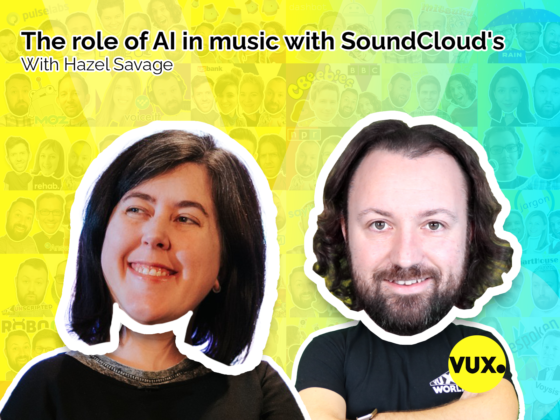In a recent episode of VUX World, I had the privilege of sitting down with Byron Reese, a visionary entrepreneur and author deeply entrenched in the exploration of artificial intelligence (AI) and its intersection with humanity.
Our conversation spanned the gamut of AI’s technical intricacies, philosophical foundations, societal impacts, and the ethical quandaries it presents. We got into the profound impacts AI may have on jobs, intelligence, and the broader future we’re collectively navigating towards.

Byron shared his optimistic perspective on AI’s potential benefits, emphasising the importance of harnessing this technology to advance human good. On the other hand, I couldn’t help but play devils advocate and voice concerns about the potential for AI’s misuse. Not because I’m not a believer, but to hear another optimists perspective on the negative outcomes we read about in the media.
The ethical considerations surrounding AI development are vast and complex. From privacy concerns to the risk of exacerbating social inequalities, it’s clear that as we forge ahead, we must tread carefully, ensuring that ethical guidelines are in place to steer the development of AI in a direction that benefits all of humanity.
One of the most thought-provoking aspects of our conversation was Byron’s perspective on AI and philosophy. He challenged the prevalent notion of humans being mechanistic beings, arguing instead for the complexity and depth of human experience that goes beyond what AI can replicate. This viewpoint opens up a fascinating dialogue about the nature of intelligence, consciousness, and what it means to be human in an age where AI technologies are becoming increasingly sophisticated.
The upshot: general artificial intelligence is only possible if you believe humans are mechanistic and that, one day, we’ll figure out exactly how we work. If you believe that humans aren’t mechanical, and that there’s more to it, then we’ll never be able to replicate our intelligence and AGI is a none starter.
From my perspective, we’re so far removed from mechanical, we can’t even agree on what the term ‘intelligence’ means, let alone ‘artificial intelligence’.
As we delved into the societal implications of AI, Byron’s belief in the fundamental goodness of humanity and the potential for AI to amplify this goodness was inspiring. However, I remained cautious, highlighting the potential for AI to be wielded by bad actors and the importance of media in shaping our perceptions and fears about AI.
The discussion on information verification and the evolution of human progress underscored the transformative potential of AI, envisioning a future where technology acts as a “planetary brain,” enhancing our collective wisdom and knowledge.
Byron’s vision for a future where humanity populates a billion planets and is aided by AI was inspiring. It’s a bold reflection on the inherent worth of humanity and our potential for exponential growth. Yet, the very people who are leading the charge in inter-planetary travel are the very people that, last year, signed an open letter asking for the pause of AI innovations, then this week, released an open source LLM.
Byron’s take on that letter is that it’s an overreaction in the wake of the launch of a powerful technology that we don’t fully understand.
Our discussion on the impact of technology on employment brought to light the dynamic nature of the job market. Byron’s optimism about technology creating new, high-skilled jobs and driving human productivity was a reminder of the endless possibilities that innovation brings. It’s a perspective that I share, especially considering how the internet and technology have already transformed the employment landscape. For example, 60% of Americans are in jobs today that didn’t exist in 1940.
Closing our conversation, Byron’s exploration of human history through the lens of data evolution was fascinating. His concept of Chat GPT as a culmination of human knowledge and his theory about the existence of a superorganism called Agora – the interconnectedness of humanity acting together as one – offered a unique lens through which to view our interconnectedness and the role of technology in advancing our species.
Reflecting on my conversation with Byron Reese, it’s clear that AI holds immense potential to shape our future in profound ways. However, it also brings to the forefront the need for critical thinking, ethical considerations, and a deep appreciation for the complexity of human intellect and the continuous learning process.
You can listen to the full conversation with Byron on Apple Podcasts, Spotify, YouTube, LinkedIn or wherever you get your podcasts.




